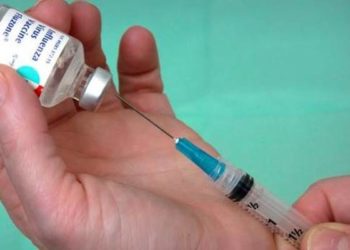Childhood varicella vaccination not linked with greater adult herpes zoster infection
Image: PD
1. The incidence of herpes zoster among United States adults has been increasing since 1992
2. However, the annual rate of increase in herpes zoster incidence has not changed significantly since the introduction of routine varicella vaccinations in children
Evidence Rating Level: 2 (Good)
Study Rundown: In 1996, a universal varicella vaccine program was implemented in the United States for children between 12 and 18 months of age. Whether this vaccine program has influenced the incidence of herpes zoster (HZ) – a painful rash caused by reactivation of latent varicella infection – in older individuals is not known. Studies have shown that adults who live with children with varicella or who have known varicella contacts are at decreased risk for developing HZ due to a boost in varicella zoster virus specific immunity. Thus, experts have hypothesized that use of the varicella vaccine may lead to an increase in HZ incidence due to a decreased frequency at which adults are exposed to the virus. This study analyzed Medicare claims data from 1992 through 2010 in order to determine trends in HZ incidence in association with the introduction of the vaccination program. Total HZ incidence among US adults older than 65 years increased between 1992 and 2010, however there was no significant difference between the annual rate of increase in HZ incidence during pre- and post-implementation periods. Additionally, the results did not vary by state vaccination coverage in models adjusted for sex, age, and calendar year. An important limitation in this study is that, given the timeframe, the Medicare participants whose data was analyzed that were actually parents (rather than grandparents or social contacts) of the children vaccinated is likely to be quite small. Nonetheless, results suggest that the recent increase in HZ incidence cannot be attributed to the introduction of the childhood varicella vaccination program. This is reassuring for other countries considering implementation of the vaccine, and argues for continued widespread use of the vaccine in the US
Click to read the study in Annals of Internal Medicine
Relevant Reading: Contacts with varicella or with children and protection against herpes zoster in adults: a case-control study
In-Depth [retrospective cohort study]: This study analyzed health care claims data from a 5% random sample of Medicare beneficiaries maintained in a Medicare and Medicaid services database. US residents who were older than 65 years and had more than 1 calendar year of Medicare fee-for-service parts A and B between 1991 and 2010 were drawn from the sample and comprised the study population. Incident HZ in a given year was defined as the first occurrence of an International Classification of Diseases code for HZ in any health care setting with no HZ code during the previous calendar year. Incidence was calculated as the number of incident cases of HZ divided by the total person-years. HZ incidence was standardized by age and sex using the 2000 US standard population. HZ trends during 3 periods of varicella vaccination program implementation (preimplementation from 1992 to 1995, early implementation from 1996 to 1999, and full implementation from 2000 to 2010) were analyzed using Poisson regression analyses.
The study included 2,845,353 Medicare beneficiaries from 1992 through 2010, with a mean age of 76.1 years in 1992 and 77.1 years in 2010. A total of 281,317 incident cases of HZ occurred during the study period. Crude HZ incidence increased 40% from 10.2 per 1000 person-years in 1992 to 14.3 per 1000 persons in 2010, and age- and sex-standardized incidences increased by a similar amount. Mean age at the time of HZ diagnosis remained stable at 76.9 years in 1992 and 77.9 years in 2010. Analyses indicated that the annual rate of increase in HZ incidence during the early implementation period (1996 to 1999) was 0.2% higher than that during the preimplementation period (1992 to 1995), however this was not statistically significant. Similarly, the annual rate of increase in HZ incidence during the full implementation period was 0.8% higher than that during the preimplementation period, though this was not significant either. The increased HZ incidence occurred across all age groups, racial and ethnic groups, and in both sexes.
By Sarah Chuzi and Aimee Lee, M.D.
©2012-2013 2minutemedicine.com. All rights reserved. No works may be reproduced without expressed written consent from 2minutemedicine.com. Disclaimer: We present factual information directly from peer reviewed medical journals. No post should be construed as medical advice and is not intended as such by the authors, editors, staff or by 2minutemedicine.com. PLEASE SEE A HEALTHCARE PROVIDER IN YOUR AREA IF YOU SEEK MEDICAL ADVICE OF ANY SORT.






